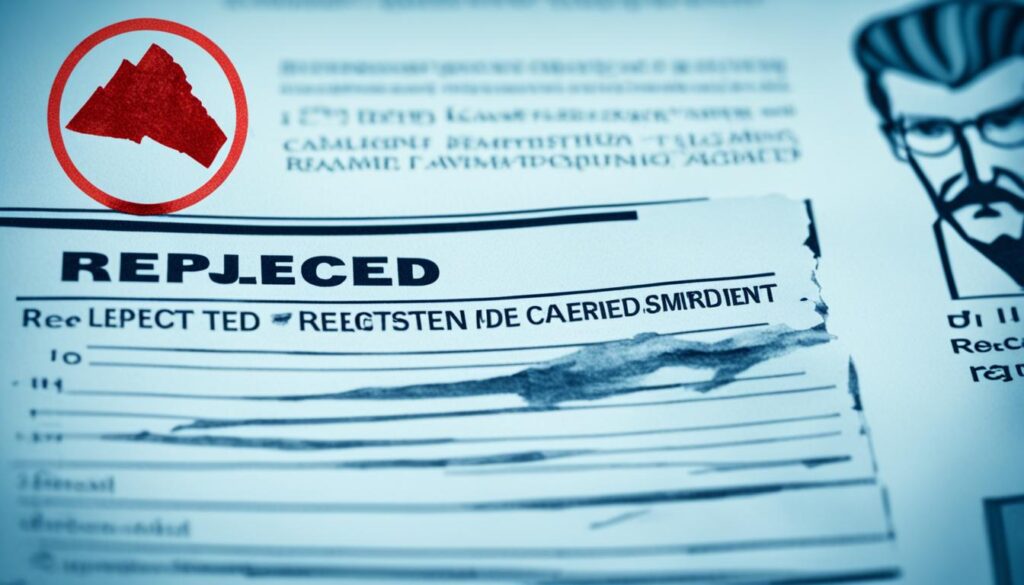Legal malpractice cases can be hard to understand. But suing a lawyer who didn’t do their job right might be your best choice. You might face clear cases, like missing a deadline, or more difficult situations.
In cases that aren’t so clear, you’ll need a skilled malpractice attorney. With their help, you can work through the legal process. They can help you get the compensation you deserve if your lawyer’s mistake cost you money.
Key Takeaways
- Legal malpractice cases can be complex, but filing a suit may be the only way to seek compensation for financial harm caused by an attorney’s negligence.
- Malpractice may be clear, such as a missed deadline, or more nuanced, requiring an experienced attorney to evaluate the case.
- Finding the right malpractice attorney is crucial to successfully navigating the legal system and pursuing your claim.
- Careful research and thorough case evaluation are necessary to determine if you have a valid malpractice claim against your previous attorney.
- The process of building and proving a malpractice case can be time-consuming, but an experienced attorney can guide you through the steps.
Understanding Legal Malpractice Cases
Legal malpractice is a big deal for both clients and lawyers. It happens when a lawyer doesn’t act with the same skill and care most lawyers would in a similar case. This might involve mistakes, carelessness, or not keeping to their promises.
What is Legal Malpractice?
As seen in the case of Lucas v. Hamm, lawyers in California must be as skillful and diligent as most other lawyers. If they fall short, clients might have a legal malpractice case.
Types of Legal Malpractice
Several kinds of legal malpractice are common:
- Missing deadlines
- Failing to follow procedures
- Conflicts of interest
- Providing incompetent legal advice
Negligence, particularly, is a key area for malpractice claims. This includes not doing as well as other professionals would under the same circumstances. Other common issues are not following client instructions and making procedural mistakes.
| Type of Malpractice | Description |
|---|---|
| Missed Deadlines | Failing to file documents or meet court-mandated deadlines |
| Procedural Errors | Mistakes in legal procedures, such as improper service of process |
| Conflicts of Interest | Representing clients with competing interests or financial ties |
| Incompetent Advice | Providing legal advice that falls below the standard of care |
In California, the aftermath of legal malpractice can harm an attorney’s reputation. It might involve regulatory repercussions, along with financial costs from defending against claims and potential damages. To lessen the danger of facing a claim, attorneys should keep learning, stick to ethical rules, talk better with clients, keep good records, and use risk management methods.
In California, if you suspect malpractice, you can get another lawyer’s opinion. If your case is strong enough, you can sue the original lawyer within a set deadline, as the law requires. You can also file a complaint against the lawyer with the State Bar of California.
Proving Legal Malpractice: The Four Elements

To win in a legal malpractice case, prove four things: a duty of care, a breached duty, causation, and damages. Knowing these elements is key to a winning strategy.
Duty of Care
The first thing is showing the attorney had a duty of care to you. It’s proven when there’s an attorney-client relationship, usually in a signed agreement. This means the attorney should have given sound and careful help, like other attorneys would have in the same situation.
Breach of Duty
Next, show the attorney broke their duty through carelessness or poor behavior. This might be missing deadlines, ignoring conflicts, misusing laws, or wrongly managing money. The point is to prove the attorney didn’t meet the standard care level you should expect.
Causation
Proving a link between the attorney’s mistake and your financial loss is important. This may need going back over the original case to see what might have changed if not for the lawyer’s slip-up.
Damages
Lastly, show you lost money because of the attorney. This can cover lost salary, higher legal fees, and other financial harm. The court will decide your losses by looking at the value of a settlement or through a case review.
To build a strong case, collect documents and get your file from the previous attorney. Meeting a legal malpractice attorney is a must too. They might need expert witnesses to confirm what a usual attorney would have done in your situation.
“Successful legal malpractice cases often require substantial re-litigation of the original case.”
Understanding and proving legal malpractice isn’t easy. But, with the right steps and help from experts, you can aim for fair compensation. This is for the trouble your attorney’s mistake has caused.
Common Complaints About Lawyers and Malpractice
Clients often worry about their lawyers’ actions. They might feel let down. For example, lawyers who suddenly stop working on a case. Or those who don’t give their cases enough effort, leading to case dismissals.
Others might have concerns about the settlements their lawyer suggests. Some lawyers might even settle a case without asking the client first. Misusing client money is also a top concern clients have.
Experts in personal injury and real estate law say about 40% of complaints are about missed deadlines. This is an administrative error. Not properly applying the law is another issue, making up around 14% of cases.
Problems with how lawyers talk to their clients, like not getting their consent, are also common. They account for another 14% of complaints. But things like fraud and abusive practices by lawyers are less common, about 10%.
Often, lack of proper communication is cited as a problem. This can lead to missing deadlines or cases being dismissed. When lawyers and their clients don’t talk enough or clearly, mistakes can happen.
| Type of Legal Malpractice Complaint | Percentage of Total Claims |
|---|---|
| Administrative Errors | 40% |
| Failure to Apply the Law | 14% |
| Client Relations Issues | 14% |
| Intentional Wrongdoing | 10% |
Not all these issues mean legal malpractice. But they do show a lawyer might be failing in their duty to the client. If you think your lawyer has acted wrong, talking to a legal malpractice attorney is a smart idea.
“Lack of communication is a common grievance among clients, with missed deadlines and case dismissals often resulting from poor communication.”
how to get a malpractice attorney to take your case
When legal malpractice happens to you, finding the right attorney is key. Start by looking for well-qualified lawyers. Then, set up meetings to talk about the details of your situation and see if they’ll take your case.
Research and Find Qualified Attorneys
First, look for attorneys who focus on legal malpractice. Find ones with lots of experience. Check their success stories and what their clients say about them. This helps you figure out who’s best for your case.
Useful tip: Try Nolo, a trusted legal source since 1971. Its editors have lots of legal experience. They can help you find good malpractice attorneys in your area.
Schedule Consultations and Case Evaluations
Next, talk to a few good attorneys to see if they can help. Bring all your important papers and details with you. This helps them understand your case better. In these meetings, the attorney will look at your case’s strengths, risks, and if it may win.
It can be tough to win a malpractice case. You must prove duty, breach, causation, and damages. Besides, in some places like Ohio, proving the original case would have won isn’t necessary. This lowers the bar slightly for your case.
By carefully picking a qualified attorney and discussing your case in depth, you’re more likely to get the help you need. This can help you go after your case the right way.
Building a Strong Case Against Your Attorney

Gathering thorough evidence is key in a malpractice case against your attorney. You need to collect your original case file from them. Also, get witness statements, medical records, and any paperwork showing how they failed you and caused harm.
Gather Evidence and Documentation
Building a well-documented case is vital. To do this, first gather the evidence. This includes:
- Your original case file containing emails, pleas, and other documents.
- Statements from people who saw the attorney’s wrong actions or the harm they caused.
- Records, finances, and other papers supporting your claims of harm.
- Notes and timelines about what happened and how you talked with the attorney.
Organizing and presenting this evidence well helps build a strong malpractice case. It shows the attorney’s breach of duty and the damages you faced.
“Gathering comprehensive evidence is crucial when seeking to hold an attorney accountable for their negligence.”
A detailed and well-documented case increases your chance of success. It can convince a court or the attorney’s insurer that your malpractice claims are valid. And, that you should get the compensation you’re entitled to.
Potential Challenges in Legal Malpractice Claims
Winning a legal malpractice case is tough. Plaintiffs need to show the lawyer was negligent. They also must show they would have won the original case without this mistake. This means proving the lawyer’s fault, showing direct harm, and calculating damages are key obstacles.
The biggest challenge is proving the lawyer messed up. Plaintiffs must prove the lawyer’s work didn’t meet normal standards. Legal cases involve judgment calls and strategy. These might be considered okay due to judgmental immunity doctrine.
Plaintiffs also need to show the harm caused was directly related to the lawyer’s mistakes. Establishing causation is not easy. They must prove winning the case was possible if not for the lawyer’s errors. This leads to a complex “case-within-a-case” analysis.
It’s also hard to figure out the exact damages from the lawyer’s mess-up. Plaintiffs have to clearly show the money they lost. This could be from missed chances, extra costs, or bad decisions. But, proving these can be tricky, especially if the original case was complicated.
“Legal malpractice claims often arise from attorneys missing deadlines, which can result in losses for clients and lead to cases being dismissed.”
There are more hurdles to face. Each state may have different rules. Some need an expert’s opinion first. Plus, these claims can’t always be given to someone else to handle. Attorneys can also argue their strategy was fine under the engagement letter or was a strategic decision made in good faith.
In the end, proving legal malpractice is an uphill battle. Solid records, expert advice, and knowing the legal details well are crucial. They increase the chances of winning in this tough field of law.
Finding the Right Malpractice Attorney

Looking for the right malpractice attorney is vital. You must find someone with lots of experience in handling these cases. Their experience greatly impacts the success of your claim. So, it’s crucial to check their knowledge, history with similar cases, and how they charge.
Experience and Specialization
Medical malpractice cases are very complex. It’s key to have a lawyer who really knows this legal area. Find attorneys with a good record of handling malpractice cases. It’s also important that their main focus is on this type of law. They’ll know the medical and legal sides well, which is key for a strong case.
Resources and Contingency Fees
Bringing a malpractice claim can take a long time and be expensive. So, look at the lawyer’s resources and how they charge. A lot of malpractice lawyers work on a contingency fee basis. This means they don’t get a fee unless you win. It’s good because it lets you have quality legal help without paying at the start. Also, aim to work with lawyers who can fully investigate your case and build a strong argument.
It’s crucial to assess an attorney’s experience, focus, and financial abilities. This will help you pick the right malpractice attorney. You want someone who can best represent you and boost your chance of winning.
“Choosing the right attorney is vital in guaranteeing that your case receives proper attention and legal representation.”
Costs and Compensation in Legal Malpractice Suits
Pursuing a legal malpractice claim is tricky and can cost a lot. But, getting compensation makes it worth considering. These suits involve many expenses like expert fees and filing charges. Yet, if the claim is successful, damages from the attorney’s mistake and lawsuit costs can be recovered.
Business deals, corporate law, real estate, and wills and estates get the most malpractice claims. Mistakes like missing deadlines or not updating clients can cause these claims.
Most malpractice claims end in a settlement, often paid in parts for cases with young victims. Insurers can help decide whether to settle or go to trial. Settlements detail all agreements between the parties.
In these cases, damages are determined by the harm caused, compared to what could have been if the case was handled properly. “Lost chances” and financial damages are usually included. But getting compensation for emotional distress is rare, unless the case involves something truly severe, like losing a family connection because of the mistake.
| Malpractice Claim Costs | Potential Compensation |
|---|---|
|
|
While the risk in legal malpractice claims is high, the chance for compensation and damages remains. Recovering from negligence is something to think about. The choice to sue needs careful thought based on your case’s facts and chances of winning.
Conclusion
Facing a medical malpractice case can be tricky. It’s vital to have the right lawyer by your side. They should be experienced and well-equipped. This way, you can make a strong case. You will also have a better chance of a good result.
To win, you need to collect proof and know the law. A qualified malpractice lawyer will guide you. They help you make those who acted wrongly pay. And you can get the money you should.
This article’s main points are clear. You must follow Florida’s time limit for filing your case. It’s critical to have strong proof for every part of your case. Plus, finding experts to help can be hard. Medical mistakes not only hurt patients but also make healthcare cost more. They might even use up more of our resources.
In short, if you’re a victim of malpractice in Tampa, don’t wait. Get a good lawyer to help you. They will lead you through the legal maze. With their help, you can seek fairness and the money you need. This will ease your stress and help you start anew.
